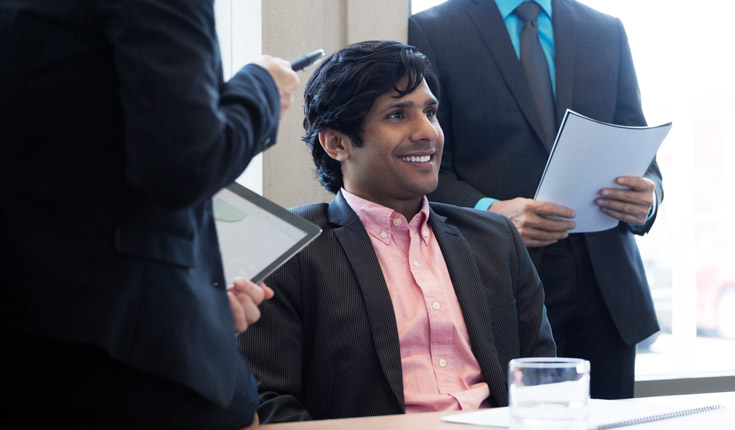Tips for Standing Out in a Group Interview


Knowing how and when to present your ideas as well as understanding the ins and outs of the group dynamic will help you emerge as a leader.
Horacio M. Borromeo, Dean of the Washington SyCip Graduate School of Business at the Asian Institute of Management.
A group MBA admissions interview, or discussion, is all about interpersonal skills. Knowing how and when to present your ideas as well as understanding the ins and outs of the group dynamic will help you emerge as a leader. These ten tips will help you stand out.
1. Appearance counts. When interviewing candidates for our MBA, the first thing we want to see is whether two years down the road you can make a good first impression with a recruiter, and presentation counts a lot toward making that first impression. Look fresh. Dress as if you’re applying for an investment-banking job in New York or Singapore. Maybe get a haircut, make sure you present yourself professionally. Women should go for an “executive” look. Skirt or pants, blazer over white blouse, always works.
2. Arrive on time. Arriving late for an interview is definitely bad form. It says you can’t plan ahead. Besides, all that running and huffing and puffing will make you sweat buckets, which may ruin your appearance. But arriving too early can also be inconvenient for your interviewer unless you can stay out of sight, and out of his/her way, especially if s/he is busy having breakfast/lunch, or still preparing for the interview session.
3. Patience is a virtue. This holds true throughout the entire session, from the time the interviewer takes attendance to the conclusion of the session. It begins with the interviewer checking the names on his or her schedule to see if everyone has shown up. Wait for your name to be called. The interviewer will realize soon enough if anyone’s name is not on the list. Wait for the interviewer to indicate where you should sit for the Group Discussion (GD). There is a logic to the GD seating arrangement—it helps them remember who’s who after interviewing hundreds of candidates.
4. Relax. We are looking for self-confidence, and nervousness is its opposite. Don’t wait for formal introductions to get to know the others in your interview. We want to see if you can be comfortable in a group of strangers.
5. Show good manners. When the group discussion starts, it’s invariably a race to see who gets to speak first. Candidates may think they’re displaying leadership by talking first, fastest, and loudest. While it may look like initiative, it may also seem like bullying, arrogance, or disregard for courtesy and good manners. So while you might think you are looking like a take-charge person, your aggressiveness may be a turn-off to the interviewer.
6. If you don’t know a topic, you can still participate. The group interview is a process of discussing a topic in order to arrive at a consensus. The group interview shows how well candidates think and convey their ideas. How much you know is less important, although every MBA aspirant should be familiar with current local and international events. If you’re given a topic you know nothing about, you can still play a constructive role in facilitating the discussion. But for heaven’s sake, if you don’t know a topic, don’t BS!
7. Demonstrate that you are a leader. Leadership traits are important, interviewers realize that during a group discussion, it’s hard to demonstrate that you have it. Remember that leadership does not mean dominance. It does not mean hogging the limelight. Leadership means knowing how to involve the other members of the discussion. Interviewers understand that leaders are also team players and good listeners. If you haven’t been listening to the others, it will be obvious in what you say and how you say it.
8. Don’t show off how much you know. Your GMAT results already tell us whether you can calculate the time it takes two trains traveling at different speeds from different directions departing at different times to converge at a given point. The interview is for showing how well you think, speak, and listen.
9. Demonstrate creative thinking. It may seem cliché, but we want to know how you think outside of the box. We want to know if you can exercise judgment, if you have an opinion, or if you can only make decisions when the numbers add up. We want to know about your friends and your relatives, what you do after work and why you enjoy what you do, how you would solve poverty, or maybe even your most embarrassing moment.
10. Avoid stock or rehearsed answers. Certain answers are sure to underwhelm your interviewer and undo whatever positive impressions they may have formed about you. Think of unique responses to common questions. Yes, candidates often tweet questions as soon as they finish their interviews, but it’s best to enter a session with no preconception of what questions you will get. Then your responses won’t sound rehearsed, scripted, or borrowed. You will end up sounding more original, more honest, and more real. Your authentic self will make a much better impression and convince us you have potential.



